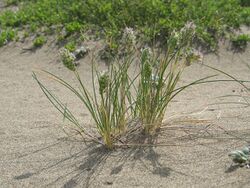Biology:Poa douglasii
| Poa douglasii | |
|---|---|

| |
| Scientific classification | |
| Kingdom: | Plantae |
| Clade: | Tracheophytes |
| Clade: | Angiosperms |
| Clade: | Monocots |
| Clade: | Commelinids |
| Order: | Poales |
| Family: | Poaceae |
| Subfamily: | Pooideae |
| Genus: | Poa |
| Species: | P. douglasii
|
| Binomial name | |
| Poa douglasii Nees
| |
Poa douglasii is a species of grass known by the common names Douglas' bluegrass and sand dune bluegrass. It is endemic to the coastline of California , where it grows in shifting sand dunes. It can be found mostly along the Central Coast and Channel Islands, and occasionally on the North Coast north of Mendocino. It is a perennial grass growing small, dense clumps up to about 30 centimeters in maximum height. It grows from a network of long rhizomes and stolons that anchor the grass to its loose sandy substrate; this network may be up to one meter long.[1] The inflorescence is a dense, oval-shaped series of overlapping spikelets. The grass is dioecious, with male and female individuals producing different types of flowers in their inflorescences.[2] This species, like many sand-dune endemic plants, is threatened by invasive species.
References
- ↑ Grass Manual Treatment
- ↑ Anton, AM; Connor, HE (1995). "Floral Biology and Reproduction in Poa (Poeae: Gramineae)". Australian Journal of Botany 43 (6): 577. doi:10.1071/bt9950577.
External links
Wikidata ☰ Q7206133 entry
 |

